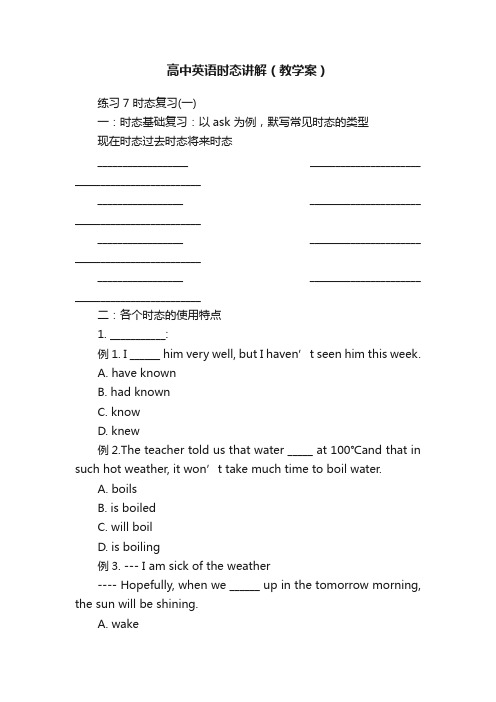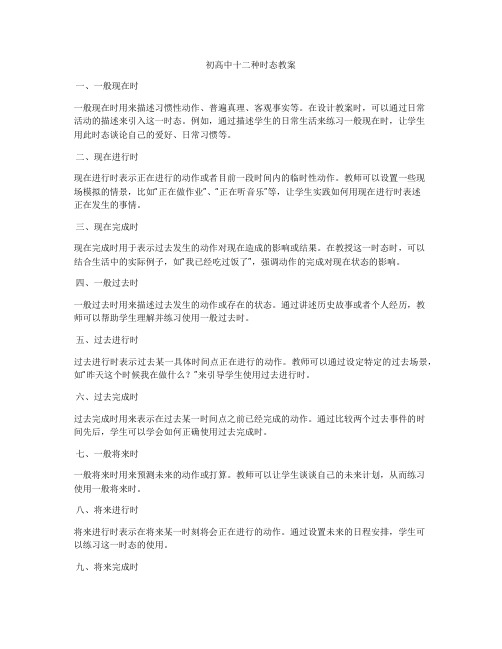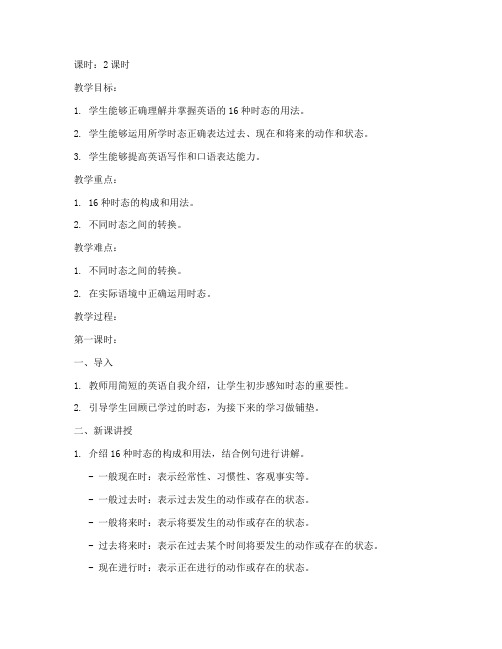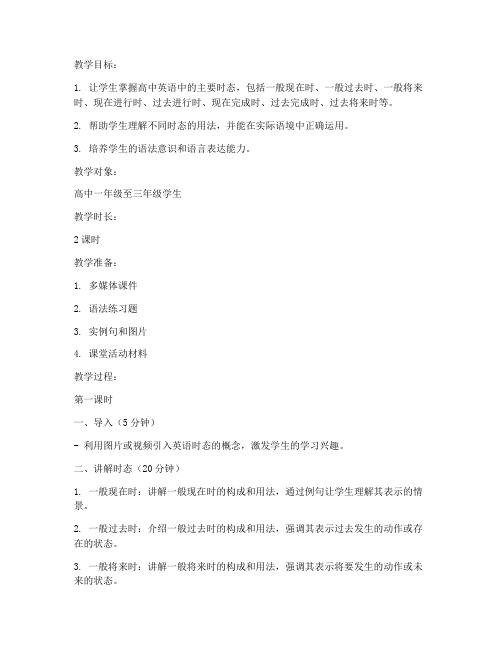高中英语时态 教案
高中英语时态讲解(教学案)

高中英语时态讲解(教学案)练习7 时态复习(一)一:时态基础复习:以ask 为例,默写常见时态的类型现在时态过去时态将来时态__________________ ______________________ __________________________________________ ______________________ __________________________________________ ______________________ __________________________________________ ______________________ _________________________二:各个时态的使用特点1. ___________:例1. I ______ him very well, but I haven’t seen him this week.A. have knownB. had knownC. knowD. knew例2.The teacher told us that water _____ at 100℃and that in such hot weather, it won’t take much time to boil water.A. boilsB. is boiledC. will boilD. is boiling例3. --- I am sick of the weather---- Hopefully, when we ______ up in the tomorrow morning, the sun will be shining.A. wakeB. wokeC. will wakeD. are waking例4. In the spoken English of areas in the US, the “r” sounds at the end of words ______.A. are droppedB. dropC. are being droppedD. have dropped.整理:____________________________________________________________________ __________________________________________________________________________ ______________________________________________________________________ __________2. ___________:例5. ---- Why did we not see Tom at Mary’s birthday party last night?----- It was said that he _______ ill.A. will beB. wasC. has beenD. is例6. He put a finger in his mouth, tasted it and ______, looking rather pleased.A. smilesB. smiledC. smilingD. had smiled例7. ---Oh, it’s you! I ____ you.!----I’ve just had my hair cut and I’m wearing new glasses.A. didn’t recog nizeB. hadn’t recognizedC. haven’t recognizedD. don’t recognize例8. While the World Trade Center has fallen, the world economy it _______ create continues.A. helpedB. had helpedC. helpsD. is helping例9. ----When did you move to Beijing?----- Last year. But I _____ in a school in Japan for 8 years.A. have taughtB. taughtC. teachD. will teach整理:____________________________________________________________________ __________________________________________________________________________ ______________________________________________________________________ __________3. ___________:例10: Put everything where they were before or the librarian ________ you.A. will punishB. punishesC. is punishingD. will have punished例11 ---- ____ they _____ in New York tonight? ---- I hope so.A. Did; arriveB. Are; arrivingC. Have; arrivedD. Had; arrived例12 -----Have you heard that John was injured in the accident yesterday?---- Oh, I ____know. I _____ see him in the afternoon.A. didn’t; willB. don’t; willC. didn’t; am going toD. don’t; am to例13. The Students ________ an Examination next week. Do you remember that?A. have hadB. hadC. are to haveD. had had整理:____________________________________________________________________ __________________________________________________________________________ ______________________________________________________________________ __________ 4. ___________:例14.----- I haven’t finished yet ----- But our friends _______ for us.A. will waitB. waitC. have waitedD. are waiting例15. ---- Have you ever handed in your school work?---- Yes. And I guess it _______ now.A. has gradeB. is gradedC. is gradingD. is being graded例16. You ______ in the library. Why not have a picnic in the afternoon?A. are always studyingB. always studyC. have always studiedD. had always studied例17. Airbus has begun taking orders from Chinese customers on the mainland and ___ more this year A. expects B. is expected C. is expecting D. will expect整理:____________________________________________________________________ __________________________________________________________________________ ______________________________________________________________________ __________ 5. ___________:例18. ---Where ________you__________ the key? I ______ it yet.A. did, put; didn’t findB. did, put; haven’t foundC. have, put; haven’t foundD. have, put; didn’t f ind例19. Mr. Smith is an Australian teacher, he ____ us English since 3 years ago.A. has taughtB. is teachingC. teachesD. taught例20. ---Do you know our town at all?--- No, this is the first time I ___ here.A. wasB. have beenC. cameD. have gone例21. We should have heard from Mary recently. I wonder why she _______ to us by now.A. hasn’t writtenB. doesn’t writeC. won’t writeD. hadn’t write例22. I’ sorry you ______ the last bus. It left ten minutes ago.A. have lostB. lostC. have missedD. missed整理:____________________________________________________________________ __________________________________________________________________________ ______________________________________________________________________ __________ 6. ___________:例23. I didn’t h ear the ring. At that time I ____ the eve ning news.A. talksB. would talkC. is talkingD. was talking例24. Shirley ___ a book about China last year, but I don’t know whether she has finished it.A. has writtenB. wroteC. had writtenD. was writing例25. The reporter said that the UFO ___ east to west when he saw it.A. was travelingB. traveledC. had been travelingD. was to travel例26. Unfortunately, when I got to her flat, she _____ , so we had only a moment for a few words.A. just leftB. had just leftC. has just leftD. was just leaving例27. --- Have you finished reading Jane Eyre?---- No, I ______ my homework all day yesterday.A. was doingB. would doC. had doneD. did____________________________________________________________________ __________________________________________________________________________ ______________________________________________________________________ __________7. ___________例28. We ____ four English songs by the end of last year.A. learnedB. have learnedC. had learnedD. would learn例29. Last month, the Japanese government expressed their thanks for the aid they ___ from China. A. received B. had received C. are receiving D. have received例30. ---Got your driving license?---- No, I ____ too busy to have enough practice, so I didn’t take the driving test last week.A. wasB. amC. have beenD. had been例31 --- Susan, you didn’t come to the party last night.--- I _____, but I suddenly remembered that I had homework to do.A. had meantB. meantC. was meaningD. would mean____________________________________________________________________ __________________________________________________________________________ ______________________________________________________________________ __________8. ___________例32 . My brother called me this morning and told me that he _____ in touch with me.A. will keepB. would keepC. is going to keepD. has kept例33.I _____ into the river when someone shouted at me “Dangerous”.A. jumpedB. was about to jumpC. have jumpedD. had jumped整理:____________________________________________________________________ __________________________________________________________________________ ______练习八时态(2)一:易混淆的各种时态(1 )__________vs __________vs__________ vs __________例1. ------Hi, if you can’t enjoy that a sensible volume, please use the earphone. I am sleeping.----- Very sorry. I _______ realize it _______ you.A. don’t; bothersB. didn’t; is botheringC. don’t; was botheringD. didn’t; was bothering例2.----- I’ll be able to go to Professor John’s lecture and consult him about my essay at four tomorrow afternoon.---- I’m afraid by then the lecture ____ and Professor John ____ reporters in the meeting room.A. will be ended; will meetB. is to end; will meetC. will have ended; will be meetingD. will be ended; is going to meet例3. --- I saw your uncle take a taxi to the airport. Why didn’t you drive him there?----I ___, but my car ____.A. would; was fixed;B. would have; was fixedC. would have; was being fixedD. did; was being fixed例4. ----Guess what, we’ve got our visas for a shout-term visit to the UK this summer.---- How nice! You ____ a different culture for three months.A. will be experiencingB. have been experiencingC. are experiencingD. will experience例5. I’m tired out. I ____all this afternoon and I don’t seem to have finished anything.A. was shoppingB. have shoppedC. had shoppedD. have been shopping例6.----Mum, I really think dad should have a break and get relaxed.---- Yes. He ______ too long.A. readB. has been readingC. had readD. is reading例7. ----Hey everyone in the office was at the dinner party in honor of Mr. Charles except you. What happened?----- I ____ Mike, my colleague. He was badly ill.A. have lookedB. was lookingC. would lookD. had looked例8. ----- What do you think of the dress, darling?--- Er,…. Sorry, dear. I _____. What did you say? A. didn’t listen B. hadn’t listened C. haven’t listening D. wasn’t listening整理:____________________________________________________________________ __________________________________________________________________________ ______ (2)__________vs __________vs__________例9. ----- Has your father returned from Africa yet?----- Yes, but he _____ here for only three days before his company sent him to Australia.A. wasB. has beenC. will beD. would be例10-----Have you seen my email about our TESL project?---- Yes. Luckily, I checked my emails. Normally, I ______ my email box for days.A. haven’t openedB. didn’t openC. hadn’t openedD. don’t open例11. ----- May I remind you that a Mr Zhang s waiting downstairs, sir?------Oh, dear! I ______ about it.A. forgetB. forgotC. have forgottenD. had forgotten.例12. I______ all the cooking for my family, but recently I have been too busy to do it.A. will doB. doC. didD. had done例13 My parents _______ Hong Kong. They were born there but have never lived anywhere else.A. liveB. livedC. were livingD. have lived例14. ----- I ________ my car key in your study. ------ I’ll go and fetch it for you.A. leftB. have leftC. had leftD. leave例15. My daughter _______ hard for more than half a year to realize her dreaming joining the Party and now her dream has come true.A. worksB. workedC. is workingD. has worked例16. I ______ for almost ten years, but now I don’t smoke now.A. ever smokedB. have ever smokedC. had ever smokedD. was ever smoking例17. The moment the New Year dancing party __ open, all the people gathering on the square cheered.A. declaredB. has been declaredC. has declaredD. was declared例18. ----May I remind you that a Mr Zhang s waiting downstairs, sir?----Oh, dear! I ____ about it. A. forget B. forgot C. have forgotten D. had forgotten.例19. The man who ___ in the deserted house alone for ten years has been settled in a nursing home.A. livedB. had livedC. has livedD. has been living例20. Suddenly everyone stopped talking. It became clear that something unexpected ______. But, for a while, I di dn’t know what it was.A. has happenedB. is happeningC. happenedD. had happened整理:____________________________________________________________________ __________________________________________________________________________ ______ (3). __________vs __________vs__________例21. -----Join us in the party tonight, would you?----- Sorry, I’m afraid not, I ______ the content of some reports with my boss.A. have discussedB. will be discussingC. discussedD. will have discussed比较----Join us in the party tonight, would you?----- I am glad, I ___ the content of some reports with my boss.A. have discussedB. will be discussingC. discussedD. will have discussed例23. –your weight. Only 115. You’d better put on a few pounds. ----- Well, actually, I ___ like a horse.A. ateB. was eatingC. have been eatingD. will eat比较:–your weight. Only 115. You’d better put on a few pounds. ---- Well, ok, I ___ like a horse A. ate B. was eating C. have been eating D. will eat整理:____________________________________________________________________ __________________________________________________________________________ _____ (4)__________vs _________例24. ----Mum, I really think dad should have a break and get relaxed.---- Yes. He ______ too long. A. read B. has been reading C. had read D. is reading例25. ----- I think the waiter has forgotten. We _____ here for an hour!----- I think you are right. He probably thinks we have already ordered.A. are waitingB. have been waitingC. have waitedD. had been waiting例26.--- Did you go somewhere on holiday?---- I __ to go to Hawaii, but I didn’t sign up for the tour in time.A. would hopeB. was hopedC. had hopedD. have hoped例27. Every year a flood of farmers arrive at Shenzhen formoney-making jobs they ______ before leaving their hometown.A. promiseB. were promisedC. have been promisedD. had been promised例28. ----Are you going to further your studies after graduation?---- I ______yet. I might make other choices.A. didn’t deci deB. haven’t decidedC. don’t decideD. hadn’t decided例29 ---- Why are looking so worried? ----- I sent my son a letter last week. But no replay ______.A. was receivedB. has receivedC. has been receivedD. had received例30. By the time they got to the quake-stricken area, the rescuers _____ what difficulty they would have helping the victims out.A. sensedB. had sensedC. had been sensedD. were sensing比较:The time they got to the quake-stricken area, the rescuers _____ what difficulty they would have helping the victims out.A. sensedB. had sensedC. had been sensedD. were sensing例31. Marlin _______ hard for long before he realized his dream and now he is popular.A. was workingB. is workingC. had workedD. has worked例32 His sister left home in 1998 and ____ since.A. had not been heard ofB. has not been heard ofC. had not heard ofD. has not heard of例33. They became friends again that day and until then, they ___ to each other for nearly two years. A. didn’t speak B. hadn’t spoken C. haven’t spoken D. haven’t been speaking 整理:____________________________________________________________________ __________________________________________________________________________ ______ (5)某些固定句型中时态是固定的:1.This / That / It is the first time +从句(_______________________)2.It’s / has been +一段时间+since从句(______________________)3.Hardly / No sooner had sb. done when / than +从句(_______________)4.It will be +一段时间+before从句(__________)/ It was +一段时间+before从句(_______)5. It’s time+从句(___________或者________________)6.would rather+从句(___________或者__________)整理:____________________________________________________________________ __________________________________________________________________________ ______二:时态综合题:注意:(1)先判断整个句子所描述的事情发生在现在还是过去,排除不符合题意的干扰项。
初高中十二种时态教案

初高中十二种时态教案一、一般现在时一般现在时用来描述习惯性动作、普遍真理、客观事实等。
在设计教案时,可以通过日常活动的描述来引入这一时态。
例如,通过描述学生的日常生活来练习一般现在时,让学生用此时态谈论自己的爱好、日常习惯等。
二、现在进行时现在进行时表示正在进行的动作或者目前一段时间内的临时性动作。
教师可以设置一些现场模拟的情景,比如“正在做作业”、“正在听音乐”等,让学生实践如何用现在进行时表述正在发生的事情。
三、现在完成时现在完成时用于表示过去发生的动作对现在造成的影响或结果。
在教授这一时态时,可以结合生活中的实际例子,如“我已经吃过饭了”,强调动作的完成对现在状态的影响。
四、一般过去时一般过去时用来描述过去发生的动作或存在的状态。
通过讲述历史故事或者个人经历,教师可以帮助学生理解并练习使用一般过去时。
五、过去进行时过去进行时表示过去某一具体时间点正在进行的动作。
教师可以通过设定特定的过去场景,如“昨天这个时候我在做什么?”来引导学生使用过去进行时。
六、过去完成时过去完成时用来表示在过去某一时间点之前已经完成的动作。
通过比较两个过去事件的时间先后,学生可以学会如何正确使用过去完成时。
七、一般将来时一般将来时用来预测未来的动作或打算。
教师可以让学生谈谈自己的未来计划,从而练习使用一般将来时。
八、将来进行时将来进行时表示在将来某一时刻将会正在进行的动作。
通过设置未来的日程安排,学生可以练习这一时态的使用。
九、将来完成时将来完成时用来表示在将来某一时间点之前将已经完成的动作。
教师可以通过讨论未来的规划和目标来帮助学生理解和使用这一时态。
十、现在完成进行时现在完成进行时表示从过去某一时间点开始一直延续到现在并且可能还会继续进行下去的动作。
通过讨论一些持续性的活动,如“我一直在学习英语”,学生可以学会使用这一时态。
十一、过去完成进行时过去完成进行时表示在过去某一时间点之前开始并持续进行的动作。
通过回顾过去的一段时间内的连续动作,学生可以掌握这一时态的用法。
高中英语时态教案模板

课时:2课时教学目标:1. 学生能够正确理解并掌握英语的16种时态的用法。
2. 学生能够运用所学时态正确表达过去、现在和将来的动作和状态。
3. 学生能够提高英语写作和口语表达能力。
教学重点:1. 16种时态的构成和用法。
2. 不同时态之间的转换。
教学难点:1. 不同时态之间的转换。
2. 在实际语境中正确运用时态。
教学过程:第一课时:一、导入1. 教师用简短的英语自我介绍,让学生初步感知时态的重要性。
2. 引导学生回顾已学过的时态,为接下来的学习做铺垫。
二、新课讲授1. 介绍16种时态的构成和用法,结合例句进行讲解。
- 一般现在时:表示经常性、习惯性、客观事实等。
- 一般过去时:表示过去发生的动作或存在的状态。
- 一般将来时:表示将要发生的动作或存在的状态。
- 过去将来时:表示在过去某个时间将要发生的动作或存在的状态。
- 现在进行时:表示正在进行的动作或存在的状态。
- 过去进行时:表示过去某个时间正在进行的动作或存在的状态。
- 将来进行时:表示将要进行的动作或存在的状态。
- 现在完成时:表示过去发生的动作对现在产生的影响或结果。
- 过去完成时:表示在过去某个时间之前已经完成的动作。
- 将来完成时:表示将来某个时间之前已经完成的动作。
- 现在完成进行时:表示从过去某个时间开始一直持续到现在的动作。
- 过去完成进行时:表示在过去某个时间之前一直持续到过去的动作。
- 将来完成进行时:表示将来某个时间之前一直持续到将来的动作。
- 过去将来完成时:表示在过去某个时间之前将要完成的动作。
- 过去将来完成进行时:表示在过去某个时间之前将要一直持续到过去的动作。
2. 教师结合例句,让学生练习不同时态的转换。
三、课堂练习1. 学生完成课本上的练习题,巩固所学知识。
2. 教师巡视指导,解答学生疑问。
四、课堂小结1. 教师总结本节课所学内容,强调重点和难点。
2. 学生分享学习心得,提出疑问。
第二课时:一、复习导入1. 教师提问学生上一节课所学内容,检查学生对时态的掌握情况。
高中时态教案

高中时态教案一、教学目标1、学生能够理解并掌握高中英语中常见的时态,包括一般现在时、一般过去时、一般将来时、现在进行时、过去进行时、现在完成时和过去完成时。
2、学生能够正确运用各种时态进行书面表达和口语交流,提高语言表达的准确性和流畅性。
3、学生能够通过时态的学习,更好地理解英语文章和对话,增强英语阅读理解和听力理解能力。
二、教学重难点1、教学重点(1)各种时态的构成和用法。
(2)不同时态在语境中的正确运用。
(3)一般过去时与现在完成时、过去完成时的区别。
2、教学难点(1)现在完成时和过去完成时的理解与运用。
(2)时态在复合句中的正确使用。
三、教学方法1、讲授法:讲解各种时态的构成、用法和特点,让学生对时态有初步的了解。
2、练习法:通过大量的练习题,让学生在实践中巩固所学的时态知识。
3、情景教学法:创设各种真实的语言情景,让学生在情景中感受和运用时态。
4、对比分析法:对比不同时态的用法和区别,帮助学生加深理解。
四、教学过程1、导入通过播放一段英语电影片段或讲述一个英语故事,引导学生注意其中的时态使用,从而引出本节课的主题——高中时态。
2、知识讲解(1)一般现在时构成:主语+动词原形(当主语为第三人称单数时,动词加 s 或es)用法:①表示经常发生的动作或存在的状态,如“ I get up at six every morning ” ②表示客观真理、科学事实等,如“ The earth moves around the sun ” ③在时间、条件状语从句中,用一般现在时表示将来,如“ If it rains tomorrow, we won't go for a picnic ”(2)一般过去时构成:主语+动词的过去式用法:①表示过去发生的动作或存在的状态,如“ I went to Beijing last year ” ②表示过去经常或反复发生的动作,常与 often, always 等连用,如“ He always played football when he was a child ”(3)一般将来时构成:① will +动词原形② be going to +动词原形用法:① will 表示将来发生的动作或存在的状态,常与表示将来的时间状语连用,如“ I will go to Shanghai next week ” ② be going to 表示打算、计划或准备做某事,如“ We are going to have a party this weekend ”(4)现在进行时构成:主语+ am/is/are +动词的现在分词用法:①表示现在正在进行的动作,如“ He is reading a book now ”②表示现阶段正在进行的动作,如“ They are building a new bridge these days ”(5)过去进行时构成:主语+ was/were +动词的现在分词用法:表示过去某一时刻或某一段时间正在进行的动作,如“ I was watching TV at eight o'clock last night ”(6)现在完成时构成:主语+ have/has +动词的过去分词用法:①表示过去发生的动作对现在造成的影响或结果,如“ I have finished my homework ” ②表示过去已经开始,持续到现在的动作或状态,常与 for, since 等连用,如“ He has lived here for ten years ”(7)过去完成时构成:主语+ had +动词的过去分词用法:表示在过去某一时间或动作之前已经完成的动作或存在的状态,即“过去的过去”,如“ When I got to the station, the train had already left ”3、练习巩固(1)给出一些句子,让学生判断其使用的时态,并说明原因。
高中英语时态总结教案模板

教学目标:1. 让学生掌握高中英语中的主要时态,包括一般现在时、一般过去时、一般将来时、现在进行时、过去进行时、现在完成时、过去完成时、过去将来时等。
2. 帮助学生理解不同时态的用法,并能在实际语境中正确运用。
3. 培养学生的语法意识和语言表达能力。
教学对象:高中一年级至三年级学生教学时长:2课时教学准备:1. 多媒体课件2. 语法练习题3. 实例句和图片4. 课堂活动材料教学过程:第一课时一、导入(5分钟)- 利用图片或视频引入英语时态的概念,激发学生的学习兴趣。
二、讲解时态(20分钟)1. 一般现在时:讲解一般现在时的构成和用法,通过例句让学生理解其表示的情景。
2. 一般过去时:介绍一般过去时的构成和用法,强调其表示过去发生的动作或存在的状态。
3. 一般将来时:讲解一般将来时的构成和用法,强调其表示将要发生的动作或未来的状态。
4. 现在进行时:介绍现在进行时的构成和用法,通过例句让学生理解其表示正在进行的动作。
5. 过去进行时:讲解过去进行时的构成和用法,强调其表示过去某个时刻正在进行的动作。
6. 现在完成时:介绍现在完成时的构成和用法,强调其表示从过去某个时间点开始一直持续到现在的动作或状态。
7. 过去完成时:讲解过去完成时的构成和用法,强调其表示在过去某个时间点之前已经完成的动作。
8. 过去将来时:介绍过去将来时的构成和用法,强调其表示在过去某个时间点将要发生的动作。
三、练习(15分钟)- 分组练习,让学生根据所给情境选择合适的时态填空。
- 教师巡视指导,纠正学生的错误。
四、总结(5分钟)- 回顾本节课所学的时态知识,强调时态的正确运用。
第二课时一、复习(10分钟)- 通过提问或小测验的方式,检查学生对时态知识的掌握情况。
二、应用(20分钟)- 给学生提供不同的语境,让他们运用所学的时态进行写作或口语表达。
- 教师提供反馈,帮助学生改进。
三、拓展(15分钟)- 介绍一些特殊的时态用法,如情态动词的时态、被动语态的时态等。
高中英语时态课教案模板

课时:2课时年级:高中一年级教学目标:1. 让学生掌握英语时态的基本概念和用法。
2. 培养学生正确运用时态进行英语表达的能力。
3. 增强学生的英语语感和语用能力。
教学重点:1. 英语时态的基本概念和用法。
2. 常见时态的构成和转换。
教学难点:1. 不同时态之间的转换和搭配。
2. 在实际语境中正确运用时态。
教学准备:1. 教学课件。
2. 课本。
3. 练习题。
教学过程:第一课时一、导入1. 教师通过提问引导学生回顾已学过的英语时态,如一般现在时、一般过去时等。
2. 学生分享自己对时态的理解和运用经验。
二、新课导入1. 教师讲解英语时态的基本概念,如一般现在时、一般过去时、一般将来时等。
2. 教师举例说明每种时态的用法和构成。
三、讲解常见时态的构成和转换1. 一般现在时:构成:主语+do/does+动词原形;用法:表示经常性、习惯性、普遍性、客观真理等。
2. 一般过去时:构成:主语+did+动词原形;用法:表示过去发生的动作或存在的状态。
3. 一般将来时:构成:主语+will/shall+do/动词原形;用法:表示将来要发生的事情。
4. 现在进行时:构成:主语+am/is/are+doing;用法:表示正在进行的动作。
5. 过去进行时:构成:主语+was/were+doing;用法:表示过去某个时间正在进行的动作。
6. 将来进行时:构成:主语+will/shall be+doing;用法:表示将来某个时间正在进行的动作。
四、课堂练习1. 学生完成教材中的相关练习题,巩固所学知识。
2. 教师针对学生的练习情况给予点评和指导。
第二课时一、复习导入1. 教师提问上节课所学内容,检查学生对时态的掌握情况。
2. 学生分享自己对时态的理解和运用经验。
二、巩固练习1. 学生完成教材中的相关练习题,巩固所学知识。
2. 教师针对学生的练习情况给予点评和指导。
三、实际语境运用1. 教师创设情境,让学生运用所学时态进行口语表达。
高三英语时态教案[修改版]
![高三英语时态教案[修改版]](https://img.taocdn.com/s3/m/d2b87d6bae1ffc4ffe4733687e21af45b307fed1.png)
第一篇:高三英语时态教案高三英语时态教案I.动词时态Verb Tenses 动词时态一:一般现在时(提示:当主语是单三时务必使用动词的单三形式)1. He______(be, am, is, are) a teacher at No. 2 Middle School. 2. He______(have, has) classes in the afternoon. 3.He______(get, gets) up at half past six every morning. 4. He always _____(come, comes ) to school on time. 5. He ______(study, studies) very hard at his lesson. 6. One and two _____(be, is, are) three. 7. Blue and yellow_____(make, makes) green. 8. The earth _____(move, moves) round the sun. 9. I will go there if I ____( be, will be, am, is, are) free tomorrow. 10. I will go there when I _____(have, will have, has) time tomorrow. 11. He won’t come to the party unless he _____(be, will be, am, is, are) invited.12. I’ll wait here until my mother ____(come, comes, will come) back. 13. Please return the book to the library as soon as you ______(finish, finishes, will finish) reading it. 14. Once you _____(see, sees, will see) him, you will never forget him. 时间状语:---never/seldom/sometimes/often/usually/always/now/every morning/once a month--- 动词时态二:一般过去时(提示:使用动词的过去式) 15. He____(be, was, were, been) here a moment ago. 16. They ____(be, was, were, been) here just now. 17. The scientists _____(leave, leaves, leaved, left) for America yesterday. 18. Last week we ______(visit, visited ) the Science Museum. 19. When I was a child, I often ____(play, played) football. 20. The students ran out of the classroom as soon as the bell ____(ring, rang, rung).时间状语:---yesterday/yesterday morning/the day before yesterday/last week/last month/last year/three years ago/a few days earlier/the other day(=a few days ago)/in 1999/after three months/ two days later/at that time/ just now/ in the past/ in those days/one day/ once / at one time--- 动词时态三:现在进行时(am/is/are +v-ing)21.I ____(write, am writing, is writing, are writing) a letter now. 22.Look, it _____(begin, is beginning, am beginning, are beginning) to rain. 23.They ____(study, is studying, am studying, are studying) medicine at the Medical Institute of Chengde these days. 24.He _____(teach, am teaching, is teaching, are teaching) an English lesson at this time. 时间状语:---now/these days/ at present/ at this time--- 提示动词look/ listen--- 动词时态四:过去进行时(was/were+ v-ing) 25.I _____(cook, cooked, was cooking, were cooking) breakfast when you arrived. 26.What ____you_____( do, did, was...doing, were…doing) at this time yesterday evening?27.We_____(have, are having, had, were having) dinner when the doorbell rang. 28.While/ When/ Aswe____( have, had, are having, were having) dinner, the doorbell rang. 时间状语:---then/ at that time/at this time yesterday/ yesterday evening/last night/ 1 when-clause(when引导的时间状语从句)---动词时态五:一般将来时(六种表达形式)①shall/ will +v. ②be going to +v.主观打算等③be to + v.客观安排等④be about to +v. ⑤be + v-ing (-come, go, leave, arrive, start, stay, return-)⑥v-/ v-s(-es)(表示按时间表发生的将来的动作)(---start, begin, arrive, end, close, leave---) 29. I ____ (leave, shall/ will leave) for Ji’nan tomorrow. 30.Who can tell me what ____(will happen, is going to happen) in the future? 31.Mr Smith _____(will help, shall help) you if you have any problem. 32.It______(is going to be, will be) Wednesday the day after tomorrow. 33.The musician _____( is going to give, are going to give, am going to give) a concert next week.34.Look, there ______(be, is going to be, are going to be) a rain soon. 35.We _____( meet, will be to meet, are to meet, am to meet) at the airport this afternoon. 36.The concert____(take, is to take, are to take, will be to take) place in the music hall tomorrow afternoon. 37.The concert ___(hold, is to hold, is to be held, will to be held) in the music hall tomorrow evening. dies and gentlemen, the plane ___(take, is about to take, are about to take,is soon about to take) off. Please fasten your safety belts. 39.We ____(start, are going to start, are starting) for Shanghai tonight. 40.The train/ concert/ show/film _____(start, starts) at six tomorrow. 时间状语:---tomorrow/tomorrow morning/the day after tomorrow/(how) soon/ before long/ by and by/ in an hour/ in five minutes’time/ five minutes later/ this afternoon/ next Saturday(week, month, year)/in future/ in the future/ sometime in the future/ some day( one day)--- 动词时态六:过去将来时41.I told my friend that I ____(should/ would arrive, shall/ will arrive) soon. 42.They looked at those clouds over the sky. It____(is going to rain, was going to rain). 43.They said that they ____(are to meet, were to meet) at the gate the next day. 44.We _____(are about to go, were about to go) out when it started to rain. 时间状语:---soon/the next day---that-clause(名词性从句或上下文中---) 动词时态七:现在完成时(have /has + 过去分词)45.We____(have cleaned, has cleaned) the room already.(暗示The room is clean now.) 46.He ____(have been , has been ) to the Summer Palace many times.( (暗示He is back now.) 47.She ____(have just gone, has just gone) to the library. ((暗示She isn’t here now.) 48.I ____( has lived, have lived) here for more than 20 years.=I_____(lived, have lived) here since I moved here 20 years ago.= It is / has been 20 years since I moved here.49.Great changes ____(have taken, has taken) place in China in the past 20 years.= There _____( has been, have been ) great changes in China in the past 20 years. 时间状语:---1)already/(not)yet/before/recently=lately2)ever/never/once/twice/manytimes3)now/just/today/ this morning 4)for…/since…/so far/ by now=up till now 5)in/for/during the past(last)few years--- 动词时态八:过去完成时(had+ 过去分词)(特征:表示“过去的过去”)50.We ____(have read, had read) 500 stories by the end of last term. 51.He said that they _____(have arrived, had arrived) an hour before. 52.After /When he ____(has done, had done) his job, he went to bed. 53.I waited till he ____(has finished, had finished) his work.2 54.When I got there, he ___(has been, had been) away for half an hour. 55.I went back to the classroom because I ____(have left, had left) my dictionary there. 时间状语:---by the end of last…---/ that-clause名从,after,before,when,because状从。
高中英语谓语动词时态教案

高中英语谓语动词时态教案一、教学目标1. 让学生掌握英语中的基本时态,包括一般现在时、一般过去时、一般将来时、现在进行时、过去进行时、现在完成时、过去完成时、将来完成时和被动语态。
2. 培养学生正确运用各种时态描述动作或状态的能力。
3. 提高学生对英语时态在实际语境中的运用和理解。
二、教学内容1. 第一课时:一般现在时概念:表示经常性或习惯性的动作或状态。
构成:主语+ 动词(原型)用法:描述习惯性动作、普遍真理、客观事实2. 第二课时:一般过去时概念:表示过去某个时间发生的动作或状态。
构成:主语+ 动词(过去式)用法:描述过去发生的动作、经历的事情3. 第三课时:一般将来时概念:表示将来要发生的动作或状态。
构成:主语+ 动词(将来式)用法:描述计划、打算、预测未来发生的事情4. 第四课时:现在进行时概念:表示正在进行的动作或状态。
构成:主语+ 动词(现在分词)用法:描述正在进行的动作、现阶段的状态5. 第五课时:过去进行时概念:表示过去某个时间正在进行的动作。
构成:主语+ 动词(过去分词)用法:描述过去某个时间正在进行的动作三、教学方法1. 采用直观演示法,通过动作、图片等展示时态的概念和用法。
2. 运用任务型教学法,让学生在实际语境中运用所学时态。
3. 采用分组讨论法,鼓励学生互相交流、合作学习。
四、教学步骤1. 引入新课:通过提问引导学生思考不间发生的动作或状态。
2. 讲解时态:分别讲解一般现在时、一般过去时、一般将来时、现在进行时、过去进行时的概念、构成和用法。
3. 实例展示:用PPT或板书展示典型例句,让学生理解并模仿。
4. 练习巩固:设计相关练习题,让学生动手实践,检测掌握情况。
5. 课堂小结:总结本节课所学时态,强调重点和难点。
五、课后作业1. 抄写本节课所学的典型例句,加深记忆。
2. 完成练习题,巩固所学时态。
3. 准备下一节课的预习内容。
六、第六课时:现在完成时概念:表示过去发生的动作对现在造成的影响或结果。
- 1、下载文档前请自行甄别文档内容的完整性,平台不提供额外的编辑、内容补充、找答案等附加服务。
- 2、"仅部分预览"的文档,不可在线预览部分如存在完整性等问题,可反馈申请退款(可完整预览的文档不适用该条件!)。
- 3、如文档侵犯您的权益,请联系客服反馈,我们会尽快为您处理(人工客服工作时间:9:00-18:30)。
高中英语教案时态总结一、时态的内涵Tense翻译为时态,包含时间+状态两个方面。
时间的划分:过去,现在,将来状态的划分:一般,进行,完成状态——实意动词:四种形式例:go, went, gone, going四种形式各有分工一般:go, went 进行:going 完成:gone例:一般I go to school every day.I went to school yesterday.进行we are learning English.I was learning English when you called me yesterday.完成We have had breakfast.I had had breakfast by 8 this morning.时间——助动词那接下来又有新的问题了。
比如说,现在分词,它只有一种形式,如going ,或者learning, 那我们时间又不一样,有过去进行的,现在进行的,比如刚才的两个例句,we are learning English, 我们用的是 are. I was learning English yesterday when you called me. 用的是was. 所以我们发现,learning是没有变化的,但前面这个are, was是变化的。
它们的变化就把这个时间讲清楚了。
而它呢,位于learning实意动词之前的这个,叫助动词。
也就是说,be,是个助动词。
如果我问be是什么词?很多同学肯定会说be是系动词,其实be又是助动词,又是系动词,这里的be就是助动词。
大家该如何理解呢,看这里,一个实意动词,只能把状态讲清楚,但因为一个状态里面,有不同的时间,比如进行,有过去进行,现在进行,和将来进行,而实意动词本身不能把这个时间讲清楚,于是就借助于,求助于,助动词来帮忙,所以这个词就叫做助动词。
那助动词是怎么分配的呢,答案直接告诉大家:一般do,进行时be,完成时 have,将来时 will。
通过do,be,have,will不同的形式变化,就把时间给讲清楚了。
好,现在造几个句子,你们就有感觉了。
第一句话:我每天都去学校。
I go to school every day.我昨天去了学校I went to school yesterday.好,这是肯定句,那要是否定句呢。
我不是每天都去学校。
I don’t go to school every day.是不是加了do这个助动词表达否定概念。
如果说我昨天没去学校,怎么说呢?I didn’t go to school yesterday.这里有人可能有疑问,问什么肯定句是went,而否定句就是 go,为什么就还原成原形了呢?很多人没有想过这个问题,或者想了没有想明白这个问题。
其实很简单,大家想一下,否定句中,这个did not,did是不是就已经表达出过去的意思了?所以go就不需要再重复的来体现一般过去时了。
而在肯定句里面,在没有助动词的情况下,只能靠go自己用过去式went来体现它的一般过去这个时间。
所以我们只要在一个点上可以体现出来就行了。
不需要重复体现它的时间,明白了吗?这就是为什么否定句、疑问句中用了did之后,后面的动词要还原的原因。
因为did 已经告诉我们它是个一般过去时了。
清楚了吗?好,到这里,我们总结一下,英语中tense,这个时态,我们要把两个问题讲清楚,一个是时间,一个是状态,我们把时间讲清楚,靠的是助动词,把状态讲清楚,靠的是实意动词四种形式,其中原形和过去式用来表达一般状态,动词的现在分词形式用来表达进行状态,动词的过去分词形式用来表达完成状态,于是时间和状态都讲清楚了,那么时态就讲清楚了。
现在来造几个句子,运用一下上面的知识。
I do homework every day.I do not do homework every day.这两个do词性是一样的吗?第一个是助动词,只起语法作用,翻译不出来,第二个是实意动词。
这两个do叫什么呢,同音同形异义词,把这个概念理解了,你就清楚了。
归根结底,这是两个单词,而不是一个单词,只不过长的一样,发音一样。
I have had breakfastI had had breakfast by 8 this morning.现在我们来用这么一个时态造句:现在完成进行时,这算简单句中比较难的一个句子。
比如说这样一句话到现在为止,我学英语已经学了十年了。
(并没有结束,还要继续学。
)现在完成 have +过去分词进行 be +现在分词have/has been + v-ingI have been studying English for ten years将来完成进行时I will have been studying English for ten years by the end of this year.过去完成进行时I had been studying English for ten years by the end of last year.再次总结。
规则:时间+状态。
一、十六种时态1.一般现在时 the present tense2.一般过去时 the past tense3.一般将来时 the future tense4.一般过去将来时 the past future tense5.现在进行时 the present continuous tense6.过去进行时 the past continuous tense7.将来进行时 the future continuous tense8.过去将来进行时 the past future continuous tense9.现在完成时 the present perfect tense10.过去完成时 the past perfect tense11.将来完成时 the future perfect tense12.过去将来完成时 the past future perfect tense13.现在完成进行时 the present perfect continuous tense14.过去完成进行时 the past perfect continuous tense15.将来完成进行时 the future perfect continuous tense16.过去将来完成进行时 the past future perfect continuous tense二、时态的表达:需要借助助动词和实意动词一般现在:I watch TV everyday.一般过去:I watched TV last night.Be现在进行:I am watching TV now.过去进行:I was watching TV at eight last night.Will一般将来:I will watch TV tonight.Have现在完成:I have watched TV.注意:1.I watched TV last night.I didn’t watch TV last night.d idn’t 已经体现了过去的意思,故watch就变为原形,不必重复体现时间。
2. 同音同形异义词I do homework everyday.I do not do homework everyday.助动词do - 只起语法作用,没有实际意义实意动词do –实际意义:做I had had my breakfast by 8 a.m. yesterday.过去将来完成进行时一、结构形式过去完成进行时由“would have been+现在分词”构成。
二、用法归纳过去将来完成进行时表动作从过去某一时间开始一直延续到过去将来某一时间。
动作是否继续下去,由上下文决定。
如:He said that by the end of the spring term he would have been studying English for three years. 他说到了春季学期末,他就学了三年英语了。
I want you thinking of food and wine, because these last years would have been miserable for you. 我要你只想吃喝,因为最近几年你的生活够苦的。
在间接引语中,将来完成进行时通常要改为过去将来完成进行时。
如:I know by this time next week you’ll have been working here for 30 years.→I knew by that time he would have been working there for 30 years.She will have been teaching in this university for 20 years by this summer.→She told me she’d have been teaching in that university for 20 years by that summer.。
